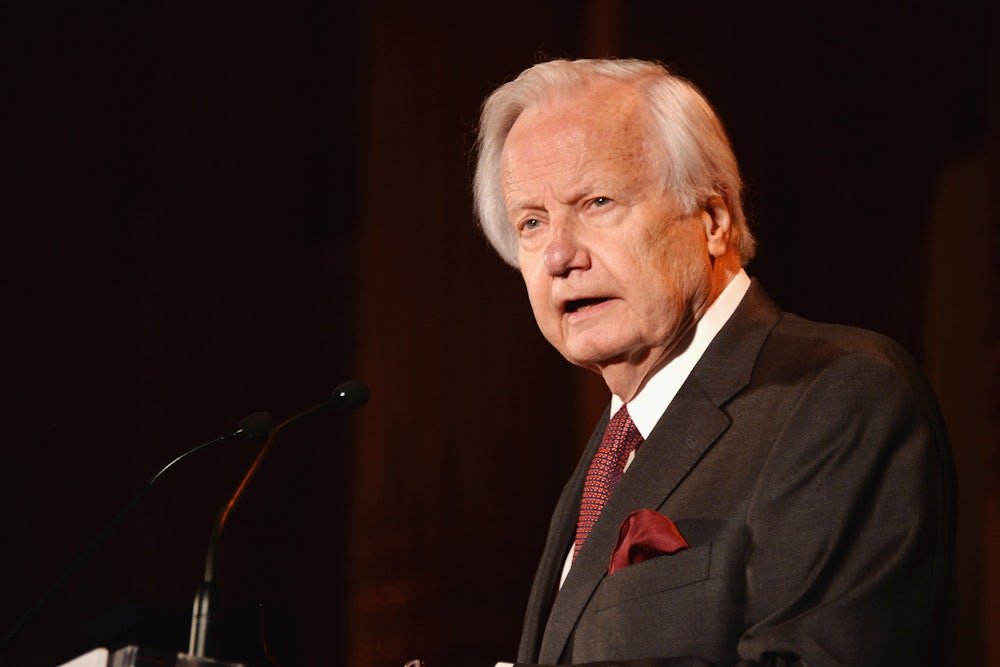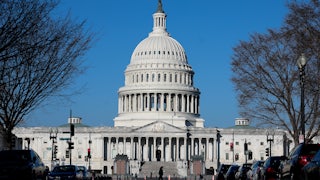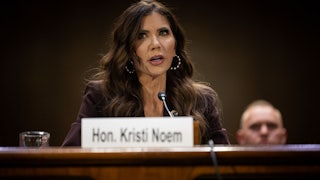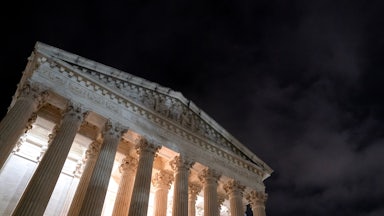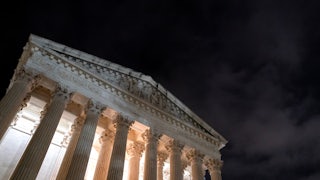I first met Bill Moyers outside the U.S. Embassy in Managua, Nicaragua, during the summer of 1987. I was there working on a spec assignment for a never-to-be-published Vanity Fair article. Bill was there with his public-television crew filming interviews with members of the crowd protesting Ronald Reagan’s proxy war on Nicaragua. I was simultaneously shocked and thrilled to see him there. As a twentysomething aspiring liberal journalist, I already regarded Moyers as a hero. There was nobody and nothing like him on television or anywhere else in the media. The much-abused journalistic cliché of “speaking truth to power” came to life in his work as nowhere else.
His dedication was demonstrated by his presence there. In the long history of that unpopular war, Bill was almost certainly the only famous television journalist to pay respectful attention to the people who dutifully marched and chanted against it every Friday morning. The result of his trip, the PBS special The Secret Government: The Constitution in Crisis more than justified my faith. Watch it, and see if you can think of any news documentary that is more historically informed and carefully reported—about that war, or about any war during America’s involvement in it—and that pulls no punches and reveals the ugly truths the government sought to repress at the time.
After our talk, Bill suggested I come to see him in New York when we got back. I bided my time writing my first book and had proposed a profile of him as a unique phenomenon in American political culture to Bob Thompson, then the editor of the then-excellent Washington Post Magazine.
Bill had recently just completed another period of what earned him the nickname at CBS the “Hamlet of West 57th Street”: first staying off the air for months and then chucking his enormously lucrative gig as a special reporter at CBS News, where he would fight with the network suits for two minutes of airtime to tell the truth about this or that outrage. He finally struck out on his own to PBS. He would do the same decades later at NBC News.
He was eventually forced to fight for airtime on public television as well, but there was one key difference between PBS and the for-profit networks: At PBS, he could raise his own money, eventually many tens of millions of dollars, that allowed him for decades to produce and star in his own programs with near-complete freedom to do what he felt to be important and was otherwise being ignored. Ironically, it would turn out to be the sort of programming he had envisioned when, back in 1967, he had helped to draft the Carnegie Commission on Education Television’s report, “Public Television: A Plan for Action,” that had led to the Public Broadcasting Act of 1967 and the creation of PBS.
A few hurt feelings aside, my interviewees at CBS when I was working on that profile uniformly felt fortunate beyond words to have had the opportunity to work with Moyers. Jon Katz, a producer at CBS Morning News, told me, “When you work with Bill, it ruins you for everyone else.” Yes, Moyers would “drive the executives berserk with his agonizing over everything, and getting him on the morning news was like a three-month Kabuki dance every time. But the end result was the most brilliant stuff we ever had.”
Another producer marveled at the fact that Moyers took the subway to work, apparently a unique phenomenon among generously compensated TV news personalities. Andy Lack, who would go on to become head of both NBC News and MSNBC, used our interview to try to speak to Bill through me about his sadness at Bill’s departure from CBS Reports, which Lack produced. Calling Bill a “mentor and father figure,” as well as “intellectually as demanding a colleague as I have ever had in my life,” Lack went on to explain: “Many things he said to me about CBS have been prophetic. He felt the news divisions were under siege. He saw it coming. He saw that they were becoming a business rather than a center for journalism as they were originally mandated. I was deeply hurt by his criticism.”
I ended up letting Lack down, as I did everyone I interviewed. Bob Thompson apparently thought my admiration for Moyers a bit too transparent for a credible profile but instead allowed me to publish some of the contents of my many interviews with Bill as a more than 7,000 word Q and A. Talk about “prophetic.” Here are a few short excerpts:
- “The problem is that the moments of reality are smothered by the steady stream of contrivances and manipulations that people now accept as the norm in politics. We are now living in a wall-to-wall culture of contrived images designed for the purposes of manipulation. Our entire society is built upon a foundation of fiction.”
- “[We] seem to have lost the ability to think about our future, to consider our responsibilities to our children, to posterity. Leaders are afraid to come forth and say, ‘This is where we need to go, and this is how we ought to get there.’ Just take the recent crime bill passed in the Senate. It is a fraud. It will compound the problems it is supposed to solve, but everybody feels better. The purpose of politics in the media age is to make people feel good, not to think critically about what we need to do to solve our problems.”
- [On fellow Texan George H.W. Bush]: “He and his kind hated the right wing, yet he caters to it now. I followed his trail through the South in the 1984 election, and what I heard was George Wallace refined, making sure the good ol’ boys knew he was one of them in keeping ‘other people’ in their place. There’s a mean spirit in the man that often acts the bully and usually toward those weaker than him.”
- “[Reinhold] Niebuhr was right: The art of politics consists of directing rationally the irrationalities of men. But when neither people nor leaders are willing to face reality, look out, brother—you’re living a lie, and nations can die of too many lies.”
I have so far focused on only a tiny part of Moyers’s incredible careers (plural on purpose). Individually, they are of enormous historical significance. Added together, they comprise a contribution to the history of this republic that stands with that of almost anyone for the past 250 years. It would take the book that nobody has yet tried to write to even begin to do justice to the man who, as an aide to Lyndon Johnson, helped created the Peace Corps (and remains the youngest person ever to be approved by the Senate, to become the Corps’ deputy director), and then, as much as anyone beside the president himself, was responsible for imagining and helping to execute the successful strategy that put in place the Great Society programs that Donald Trump is now seeking to tear down. He left that White House in 1966 over his frustration with his inability to influence Johnson to wind down the Vietnam War, to embark on what I have argued is the most distinguished and valuable career of any American television journalist ever.
Moyers had a third, lesser-known career as a philanthropist, in care of the roughly $60 million foundation put at his disposal by Florence Ford and John J. Schumann Jr., heirs to a fortune created by General Motors. With what became the Schumann Center on Media and Democracy, Moyers helped to shape much of progressive journalism, environmental activism, and opposition to the power of money in politics in the United States for roughly 30 years. For a description of a few of the high points of his career, you can start with Janny Scott’s Times obit.
In one of those wonderful “only in New York” stories, this ordained Baptist minister from a little town called Marshall, Texas, somehow became, for most practical purposes, my rabbi. No one, not my mother, romantic partners, or any of my editors ever responded to my work with greater appreciation and encouragement. Bill would frequently call me and ask if I was free for dinner that night, and I always made sure to be. We would discuss frequent projects he was thinking about, both for himself and for me, and he would promise me funding for whatever work I wanted to do if he thought it was important, and I was assured of a place to publish it. It was all done above board, with the foundation board’s approval, which didn’t always come. (Occasionally, when he let an idea I liked drop, he apologized and blamed “the bourbon talking.”) I would also draft memos for him and outline speeches he was slated to give; speeches he always improved upon to a degree that I barely recognized them when I heard them as a member of his audience.
Here are a few stories you won’t find in any of the recently published obits.
- Bill’s much-discussed refusal to be interviewed by Robert Caro—also a friend, and whose case I pleaded with Bill more than once—was, he said, based in part on the fact that he did not trust his memory and had too much work to do and couldn’t perform the research necessary to get things right. More than that, however, he did not feel right about trying to justify himself to Caro. It felt too egotistical to him, he said. One could say he was willing to trust himself to history. My own theory, however, was that he was deeply, and I mean deeply, pained by some of the things he went along with as a young man in the Johnson administration, though these are not the ones he has sometimes been accused of. He was, he explained when I questioned him in some detail on some of the allegations in the 1991 interview, “I was a very flawed young man, with more energy than wisdom.”
- After Jimmy Carter was elected president in 1980, he called Moyers to offer him the directorship of the CIA. Moyers happened to take the call in Havana, where he was interviewing Fidel Castro. He told the dictator what Carter had said, and Castro offered to denounce him in a speech that night if he thought it would help him with the Republicans in Congress.
- During the election of 1992, both Ross Perot and Bill Clinton proved extremely eager to be able to secure Bill’s support. (One of the many “Moyers for President” boomlets had already begun that year, started by Molly Ivins.) While briefly leading in the polls, Perot offered Bill both the vice-presidential spot on the ticket and the chairmanship of the campaign, together with an investment of $120 million (just under $275 million in today’s dollars) to win it. Bill considered this for a while and asked me if I would be willing to leave my doctoral program in history at Stanford to be his deputy. But after speaking to Perot a few times, he decided the dude was nuts and went back to work.
As Perot was working on Bill, George Stephanopoulos and I talked frequently about how to convince Clinton to consider Bill as his vice president. At one point, Clinton said to George, “I do think Moyers would be best.” Al Gore turned out to make a lot more sense, but immediately after the election, Clinton invited Moyers—as a fellow Southerner and, apparently, the Democratic Party’s recognized “wise man”—to Little Rock to seek his advice about the task that lay before him. I had been hoping that Moyers would call me and say, “We’re going to the White House. I’m going to be chief of staff.”
George did not want this, however, because he wanted a weaker person in that position, who would not be able to impede his access to the president. This is what happened when Clinton picked his boyhood friend Mack McLarty, who lasted less than 18 months in the job. It had not, however, been a done deal in Little Rock that night. Bill told me that Clinton had said to him, “Have you ever thought of serving your country again?” Bill told he me he replied, “I think I am serving my country right now.” This was true, of course, but not in the way Clinton meant it. Clinton and Moyers went to see A River Runs Through It that night at the local Little Rock theater together when they should have been drinking bourbon and plotting how to save this country.
Next, Hillary Clinton tried to salvage the situation by asking Bill if he would set up a think tank/seminar program operating inside the White House for the president and his staff. Bill had no interest in this, nor in being named librarian of Congress, which Clinton later offered Bill as yet another consolation prize. After his struggles with Johnson, CBS, NBC etc., Bill could not really imagine working for anyone except himself.
- Bill and I shared an obsession with the right-wing takeover of the news business and with the gutlessness with which so many in the mainstream media challenge its various bullshit narratives. With the Schumann millions at his disposal, he entered into discussions at one time or another to buy Mother Jones and The Washington Monthly, to take over The Nation and the Columbia Journalism Review and to create, during the days of Martin Peretz’s ownership of this magazine, what we were then calling “a liberal New Republic.” None of these came to fruition, though at one point, we had a deal with Rick Hertzberg, a former two-time editor of the actual New Republic and then Tina Brown’s deputy editor at The New Yorker, to co-edit this Holy Grail of liberal publications with me. But Rick ultimately backed out and decided to remain at The New Yorker as a writer. Bill eventually committed many millions of dollars to expanding both the reach and frequency of The American Prospect (and later paid for my two years writing my “Altercation” blog there).
- In addition to funding my work and that of numerous others in this field, he commissioned me at least half a dozen times to write memos about how we would create a new sort of think tank–media organization that would fund and publish reporting that had no other place but also give journalists and intellectuals a place where they would be appreciated and could make contacts and maybe even occasionally be fed. Here again, however, when we came close to achieving it—a lifelong dream of mine, along with a liberal New Republic—he pulled back yet again. It would have been located inside the CUNY Graduate Center, and Bill did not want to risk being in any way beholden to the whims of the politicians who helped to fund it.
Here’s a story that does not actually qualify as news, but I love it and hey, it’s history. Thanks to Judith Davidson Moyers, Bill’s wife of more than seven decades as well as the CEO of his production company, I was invited to join him and about a dozen former members of the Johnson administration who were still alive at a 70th birthday lunch for Bill at the Century Club. When it came to my turn to ask a question, I changed the subject from LBJ to JFK and asked: “As a political historian,” I said, “I keep reading of John Kennedy’s legendary ‘charm.’ Can you explain how it worked?”
Here’s the story Bill told. Given the animosity between the Kennedy and Johnson camps during the 1960 campaign and after, 25-year-old Billy Don Moyers was the only person the Kennedy people could stand to deal with in LBJ’s entourage. When Johnson insisted that Kennedy and his top aides visit him at his ranch for a weekend of hunting and drinking, Bill greeted the president-elect at the door. A well-briefed JFK told Bill he was looking forward to working with him. Bill said that he was sorry, but he was planning to go back to school and earn his Ph.D. in American studies at the University of Texas in Austin. (He had earned his B.A. in journalism there, as well as a Master of Divinity from Southwestern Baptist Theological Seminary in Fort Worth.) Kennedy looked at him, shocked and amazed, and then smiled, and said, “Wouldn’t you rather work for Lyndon and me for eight years and then be named president of Harvard?”
Bill grew more radical with age, surpassing me by a considerable margin in this direction. I thought our job was to try to force the elites to do the right thing by embarrassing them when they didn’t. Bill had given up on elites and sought, somehow, to spark a popular uprising among regular people, badly misjudging where that might lead. He was eventually forced to settle for the noble task of enabling honest people to better understand their world and helping them feel less alone in it. Bill loved nothing more than to read aloud the letters readers sent him about how much his work meant to them.
To me, however, the question always remained: Where did Bill Moyers find the fortitude to commit himself to so difficult a path when it ultimately led to his becoming an all but lone voice shouting into the media wilderness? I don’t have an answer, but here was his, given in an interview with Salon in 2003:
I think my life, and certainly my career in journalism, have been informed by two things. One was being a Southerner. Whenever you learned about Southern life, you realize that when we drove the truth-tellers out of the pulpits, out of the editorial rooms and out of the classrooms—people who were telling the truth about slavery—that politics failed and we wound up in the Civil War, from which we still haven’t recovered.… Being a Southerner informed me about what happens when a society closes the wagons around itself, when it doesn’t tolerate good journalism or prophecy in the pulpit or truth-telling in the classroom.… The other thing was being a part of the Johnson administration, where we pulled the wagons around us on Vietnam, and we—the government, the administration and the country—paid a terrible price for that. So my journalism has grown steadily to be very skeptical, in the public interest, of any hegemony of thought or uniformity of ideology that’s in charge. I’m deeply troubled by the lack of debate in the country, by the suppression of dissent, by the secrecy.
May his memory be a blessing.
